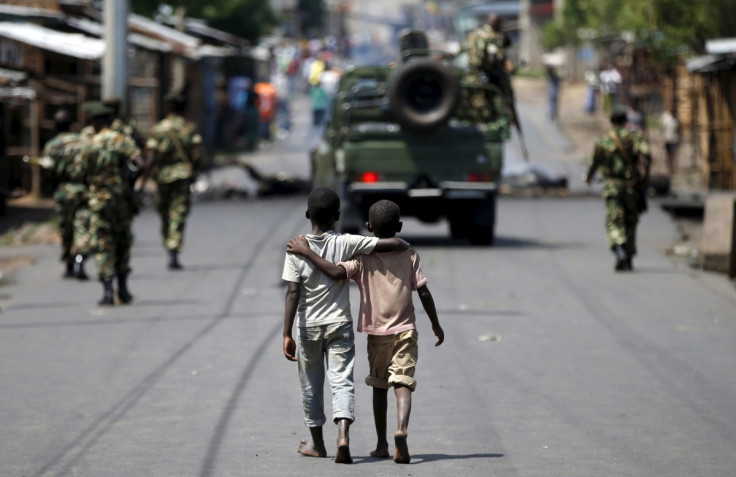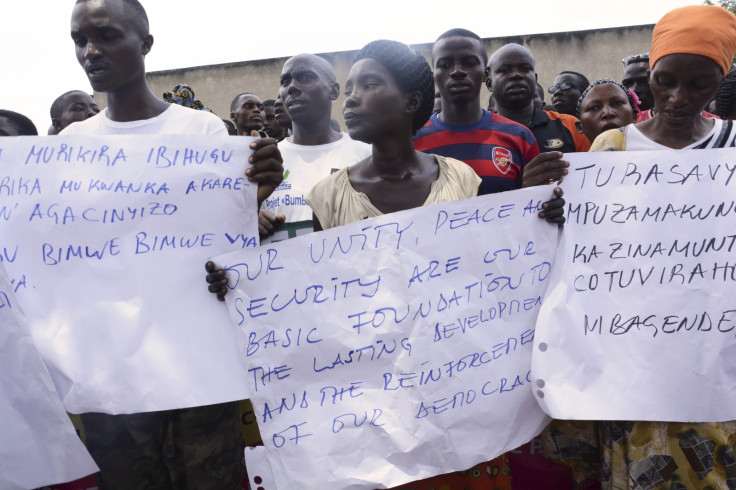Ethnicity, power-sharing and democracy: Five questions to understand Burundi's conflict
IBTimes UK speaks to Dr Stef Vandeginste about the potential fall of power-sharing in Burundi.
Burundi could be heading for a Rwandan-style genocide after a number of calls for ethnic-based massacres emerged on social media in recent months – orders the embattled authorities have condemned.
The east African country's past is scarred by the Hutu-Tutsi ethnic conflict which resulted in the slaughter of between 80,000 and 200,000 Hutus by the Tutsi army in 1972, and the civil war from 1993 to 2005 which left 300,000 people dead following massacres of the Tutsi by the majority-Hutu populace.
Most people in Burundi today say they want peace, but as the country sank deeper into a low-level conflict, the sensitive issue of ethnicity has once more come to the fore.
IBTimes UK spoke to Dr Stef Vandeginste, a Burundi specialist and lecturer in Governance, Conflict and Development at the Institute of Development Policy and Management at the University of Antwerp, Belgium.
What are Burundi's long-standing ethnic divisions?
SV: "Burundi is a paradox. Although a country where the classical criteria of ethnic identity – differences in terms of language, religion and territory – are not present, the Burundian civil war was the result of long standing ethnic divisions between the majority Hutus and the minority Tutsis groups.
"The conflict which emerged shortly after independence is essentially about the accession to, control of and transfer of political power. Within that political competition, however, ethnic identity and affiliation has been a crucial element. So, much of the conflict and the violence that Burundi has known for so many decades revolved around the importance of political ethnic identities."
"Burundi is by far the most 'consociational' power-sharing state on the African continent. Of course, the reality is that ethnicity has over time become a matter of individual and collective self-identification with great political relevance. And that is something people on all sides of the political spectrum, even at the two extremes will agree on.
"The argument that we should forget about ethnic categories because everyone is just a citizen of the Burundian state is reminiscent of the ethnic amnesia approach that Rwanda has adopted. The remarkable thing is that it is always the politically dominant ethnic group that puts forward that argument.
"In the late 1970s and early 1980s, President Bagaza, a Tutsi, also said there are no ethnic groups, [that] 'We are all Burundi'. We are in a different political setting today, by which the dominant group may put forward the argument that if you remove the ethnic segmentation as a politically relevant factor, there is no need to share power."

Why is the issue of ethnic power-sharing of historical importance?
SV: "In Burundi there have been no winners to the war, contrary to Rwanda, where one party staged a military victory. So, Burundi's transition to peace was very much based on a negotiated compromise involving power-sharing. That power-sharing in Burundi has two dimensions:
- A classic power sharing between incumbents and insurgents, like so many African countries have seen. If there is no military victor, both parties decide to form a government of national unity as a way to laying down arms.
- In addition, Burundi has developed a very complex system of ethnic power-sharing which in the literature is called 'consociational power sharing'.
"The roadmap to peace that has put Burundi on the way to stability and the end of violent conflict was determined at Arusha [a city in Tanzania] and found its way in the constitution of March 2005. One of the cornerstones of Burundi's stability has been power-sharing in the political and military, security spheres.
"Essentially, this guarantees the representation to elites of both ethnic groups at the level of the state institutions – a key to Burundi's 'success story' between 2005 and 2015.
"Given that background, any given attempt to undermine that balance of power that has come out of the Arusha peace negotiation [Burundi's 2000 negotiated transition to peace] is fundamentally risky, because inevitably, it may affect the stability of the state foundations and undermine the trust that people have as individuals and as identity groups in the state to ensure their protection."
Is Burundi's balanced power-sharing under threat?
SV: "On a number of occasions, the dominant party CNDD-FDD has officially stated that some "errors" laid down in the Arusha agreement and the constitution need to be corrected, without specifying which ones.
"The crisis remains a largely political conflict – which trigger was a debate around the president's third term that divided the whole political scene into two camps – but today, looking at how this political crisis and its evolution is being framed including on social media, it is getting a different meaning. There appears to be a more ethnic fault line appearing.
"Given the current context, it's particularly the demographic minority group [Tutsi] that has most interest in sustaining the protection offered by the Arusha agreement, while at the time of the Arusha negotiations, Tutsi politicians were more reluctant to accept such power-sharing. So the current political pact, so far, remains that of 2000 while the balance of powers has shifted importantly. This 'mismatch' is almost inevitably destabilising.
"Making it all even more complex, this issue is related to another debate (linked) to the Arusha agreement: constitutional amendments to allow a fourth term in office by President Nkurunziza. The intention to have the constitution revised has been confirmed by the President in his New Year's address, but we don't know for sure what provisions, or which articles will be affected."

Does it mean a new constitution will be brought in?
SV: "There has been a debate at the Council of Ministers in October (2016), discussing the establishment of a commission to prepare the constitutional amendments. While the principal decisions may have been taken, there are so far no indications the Commission has been officially established. There is also no information about how far down the government has gone in the constitutional drafting process.
"A constitutional amendment removing term limits would run against the Arusha agreement, but might perhaps leave the whole ethnic power sharing instruments untouched. This kind of debate, like any Constitutional amendment process should hopefully be as broad-based as possible.
"I'm not recommending that the Constitution and power-sharing agreement should never be amended in any possible way because it is not set in stone until the end of times, but if you start amending some of the elements of it, don't do so on a unilateral basis.
"It should not be a quick and dirty job that gets pushed through, as was attempted in end-2013, with the failed attempt to push through a new Constitution without much consultation. Let's hope that, even if the context has become even more difficult, that this can be a participatory and inclusive process.
"Touching at the basis of a consensus democracy requires the participation of the most possible part of the society and of political actors involved in the process."
On 16 February, the Council of Ministers is expected to discuss a draft decree establishing the committee responsible for proposing the amendment of the constitution, including its mandate, composition and operation.
Could a referendum be enough to show people's opinion on the amendments?
SV: "No. I can only hope it doesn't go through a referendum because these issues, when it comes down to majority versus minority groups, are simply not fit to submit to a referendum. It may sound undemocratic to speak out against the use of a referendum, but a referendum is fundamentally at odds with this this kind of setting."
© Copyright IBTimes 2025. All rights reserved.






















